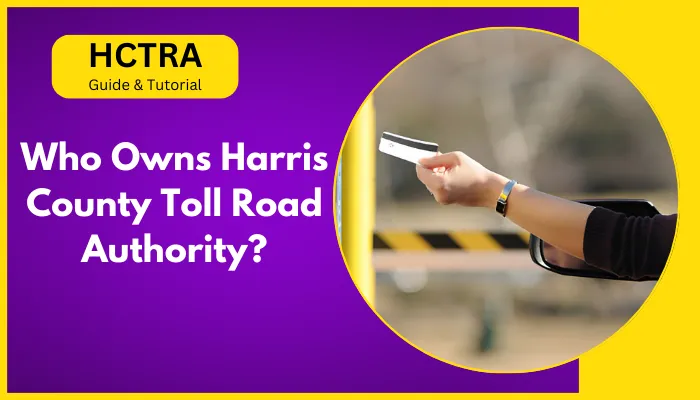Let us consider the topic of Who Owns Harris County Toll Road Authority. As a powerful entity based in Houston, HCTRA holds its authority over several toll roads including but not limited to Sam Houston Tollway and Hardy Toll Road, both of which are frequently utilized by commuters/bikers, such as yourself.
However, understanding who owns Harris County Toll Road Authority and how it operates is key to grasping the larger picture of infrastructure in Harris County. In this post, we’ll explore the intricate details underlying the fundamental question.

Understanding HCTRA
The HCTRA or more prominently referred to as Harris County Toll Road Authority plays an imperative role in constructing, operating and managing tolls on highways within Houston.
As of now, there are over 100 miles of highway and with expansion there is a need to focus upon HCTRA’s organizational structure and its importance in the expansion for long-term and everyday travelers. Let’s get started!
- Understanding Ownership: Knowing who owns and operates HCTRA helps you understand how decisions are made, fund allocation, and potential toll rate changes.
- Decision-Making: It reveals whether the government or private investment firms influence key decisions regarding toll roads.
- Commuter/Resident Impact: HCTRA controls toll roads that affect your daily commute, whether to work, school, or travel.
- Maintenance and Development: It’s important to know who is responsible for maintaining and improving the roadways you rely on.
Last time we covered the general scope of the project, Let’s cover in detail what HCTRA happens to be, and Who Owns Harris County Toll Road Authority.
What is the Harris County Toll Road Authority?
Before we get into ownership specifics, it’s helpful to understand what HCTRA is and what it does.
An Insight on HCTRA’s History and Formation
- Inception Year 1983: The highest court has ruled that until the fledged Interstate system, HCTRA would develop strategies forecasting the need for toll roads within the Houston metropolitan area. Today, however, it retains its relevance boasting a key position as one of the few toll authorities in the United States.
- Goal: In a bid to curb the cumbersome traffic build-up that used to be prevalent – HCTRA – was born.
Description of HCTRA’s Operations in Harris County
- Main activities: HCTRA’s chief mandate is to develop, construct and operate a system of toll roads, located throughout Harris County.
- Maintenance: Everything from the seamlessly smooth surfaces with structurally sound bridges equipped with an impeccable toll collection mechanism is part of what constitutes perfectly well-maintained roads.
- Traffic circulation: Well, any competent engineer would tell you that the best solution is to employ a toll collection facility that operates on set zones and allows for cashless tolls.
HCTRA Managed Key Toll Roads
Here’s just a tiny example of some of the hefty tolls HCTRA has to deal with:
- Hardy Toll Road: Key artery for traffic from the downtown hub to the outskirts of North Houston.
- Sam Houston Tollway (Beltway 8): Aiding in decongesting the city by interlinking different highways and serving as a perimeter to the city of Houston.
- Westpark Tollway: Links a good number of suburbs to a few freeways within the western region of the Houston city.
- Fort Bend Toll Road: Acts as a pathway for people who wish to go to Fort Bend County from the southern region of the area.
HCTRA significantly affects the transportation system in existence in the area, so it is imperative to investigate who manages this authority now.
Ownership of HCTRA
Next, the burning question – who is behind the ownership and management of this Harris County Toll Road Authority?
HCTRA’s Ownership Structure
- Public ownership: The Operative Harris County Toll Road Authority is entirely a Texan Government Controlled Agency. It is wholly owned and controlled by the region of Harris County, thereby restricting private ownership of shares and control. It is housed within the Public Infrastructure Department of the County.
- Not-for-profit: As indicated by the abbreviation HCTRA, the organization operates on a number of toll stations decentralizing its control. In contrast with companies, which prioritize profit-making, HCTRA operates on a broader goal. That goal being, the construction upkeep or operational costs of these toll roads.
Role of Harris County Commissioners Court
- Leadership: The regional-appointed Heads of the Harris region are tasked with the supervision of HCTRA activities including policy formulation and policy implementation.
- Approval of budget: In making decisions like projects or rate changes, Commissioners aid in negotiations and determine the budget as well as we make critical decisions.
This particular ownership structure enables one to appreciate the magnitude of role played by Harris County in the provision of regional infrastructure and transport policies. Now we will turn to the issue of financing the HCTRA projects.
Funds and Revenue
Although HCTRA collects tolls for some of its facilities, there are other associated funding sources available. We can break it down this way:
Gate Revenues
- HCTRA financed tolls: Revenues originating from HCTRA financed tolls represent the biggest share in all sources of financing HCTRA-owned roads. Tolls are distance-based and respective rates usually vary by the type of road.
- Bonds: HCTRA sells bonds in order to raise funds for weatherization and capacity expansion projects. These bonds are using revenues collected from motorists traveling on toll roads.
- Grants and other funding: HCTRA sometimes also gets money allocated by federal and state governments to promote the construction and improvement of the roads.
Division of the Revenue Amount collected as Tolls
The contribution of HCTRA to its expenses is given in the table below under the classification of revenue category:
| Expense Category | Percentage of Revenue |
|---|---|
| Maintenance and Repairs | 40% |
| Debt Service (Bonds) | 25% |
| New Road Construction | 20% |
| Operational Costs | 10% |
| Emergency Reserves | 5% |
Application of the Amount Generated through Tolls
- Road Installation Works: This includes, installation works, replacement and upgrades of existing infrastructure such as roads, bridges, and maintenance of the toll systems.
- Expansion of Projects: A portion of the revenue collected is also used for the development of further toll roads in other regions making transportation accessible throughout the region.
Having clearly established how HCTRA is funded, let us now analyze the functioning of the organization in relation to other private and public actors.
Conclusion
So, Who Owns Harris County Toll Road Authority? A ’Public Entity’ is owned by Harris County and is regulated by the Harris County Commissioners Court. Considering its key function of maintaining and increasing toll road coverage, HCTRA is very important for the infrastructure of that region. The collection of tolls is used to finance construction and other projects aimed at improving traffic and mobility for the local and commuting population.
Exactly Who Owns Harris County Toll Road Authority can be regarded as crucial for those who drive on these roads as well as for those that have interests in the management of the transportation system of the county.
